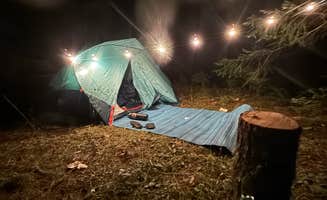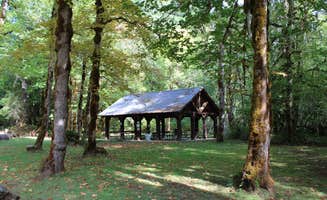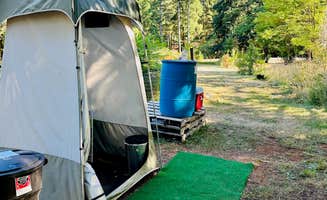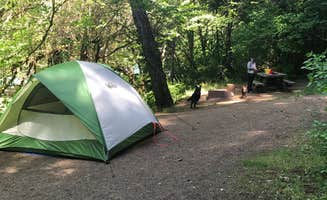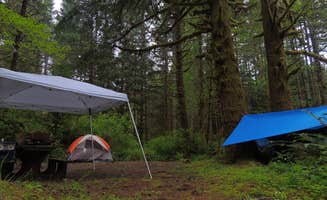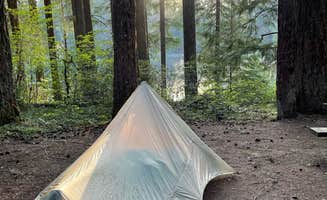Tent camping opportunities near Dexter, Oregon center around the Fall Creek Reservoir area, approximately 25 miles southeast of Eugene. The region features coniferous forest at elevations between 800-1,200 feet with summer temperatures typically reaching 85-90°F during July and August. Water levels at Fall Creek Reservoir fluctuate seasonally, affecting swimming access, with late spring offering the highest water levels.
What to do
Explore forest swimming holes: Fall Creek offers numerous swimming spots beyond the reservoir. At Big Pool Campground, visitors appreciate the waterfront location. As one camper notes, "Being right on the water truly can't be beat! It's usually not one of the busier ones out this stretch of road, and is close enough to Fall Creek to reasonably run in for supplies."
Hiking opportunities: Several trails connect from campgrounds to nearby ridges. At Whispering Pine Horse Camp, campers can access multiple trail systems. One visitor mentioned, "The scenery is amazing. The smell of the trees in the summer is my favorite part. Lots of great trails to hike."
Wildlife observation: Early mornings offer opportunities to spot deer, osprey, and various songbirds around camp areas. The quieter portions of Fall Creek host river otters and occasional beaver activity, particularly at dawn and dusk.
What campers like
Group camping facilities: The organizational campgrounds provide excellent options for larger gatherings. One camper at Clark Creek Organization Campground shared, "Wonderful group camp that can sleep all your friends and relatives! Fun little bunk houses for the kids and a big covered area for cooking and hanging out. Big field for tents, frisbee, drum circles, etc."
Cell service reliability: Some campsites maintain usable phone reception despite their forest settings. At Cascara Campground, a visitor reported, "Great Verizon service, and bathrooms."
Off-peak solitude: Weekday camping provides significantly more peaceful experiences than weekends, particularly in May and September. Campgrounds remain accessible but far less crowded, with cooler temperatures and more wildlife activity.
What you should know
Limited drinking water: Many campgrounds lack potable water sources. One camper at Sweet Home Ranger District advised, "All areas are secluded, you can choose any place to camp at many options, no phone service but great area to fish and explore the forests, it's a bit of a ways in but the drive is quite nice."
Extra vehicle regulations: Most campgrounds charge additional fees for more than one vehicle. A visitor to Cascara Campground warned, "Nice campground and great swimming, but there is very little parking. If you have more than 2 vehicles you have to park outside the camp ground and walk back in...I had to park a mile away, and this was after paying the $7 parking fee."
Changing water conditions: Reservoir levels can impact recreational opportunities. A regular visitor noted, "This used to be one of my favorite spots, and it's still a great little campground, but you used to be able to jump off the dock right into the reservoir, and now the level is kept so low that much of the recreation is no longer accessible."
Tips for camping with families
Child-friendly swimming areas: Some sites offer designated swimming zones with safety equipment. At Cascara Campground, a parent mentioned, "The camp sites were decent size and they have life jackets for little ones."
Multiple accommodation options: For multi-family gatherings, certain campgrounds offer both shelters and tent spaces. As one visitor to Clark Creek Organization Camp explained, "This group camp is amazing, so you better book it far in advance. I went here on a church camp out. It is the perfect place for families. The older teens loved sleeping in the shelters, while the parents preferred tents."
Sound considerations: Many campgrounds have limited separation between sites, affecting noise levels. A camper observed, "Sites are decently taken care of, pretty basic setup. Not much privacy at all between spots, though there were a couple larger ones on the edge of the loop that were tucked in away from others."
Tips from RVers
Access challenges: The best tent camping near Dexter, Oregon can involve navigating forest roads with occasional obstacles. One RVer suggested, "If you have a Sedan watch for large rocks on the way up as they tend to be hazardous."
Smaller RVs recommended: Most campgrounds around Fall Creek can only accommodate smaller trailers and RVs under 30 feet. Sites typically offer dirt or gravel parking pads with limited leveling areas.
Weather preparedness: Spring and fall camping requires extra preparation for rain. While summer typically remains dry, overnight temperatures can still drop significantly even in July and August, often falling to the low 50s.


